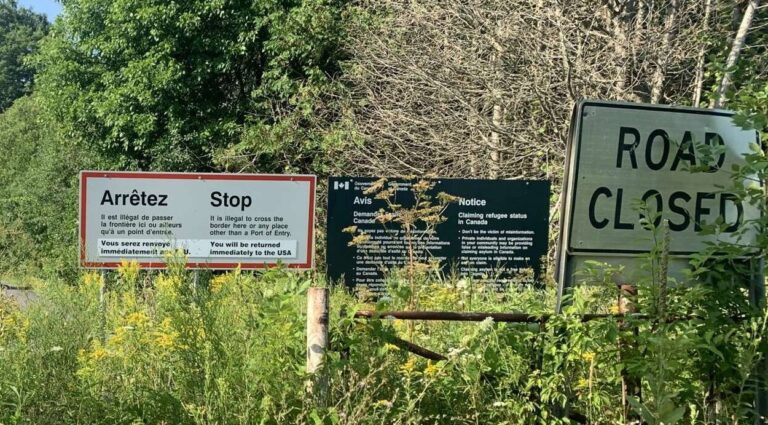
Migrante Canada statement on the closure of Roxham Road
Migrante Canada, the alliance of Filipino migrant organizations across the country, joins the other migrants’ organizations in condemning the recent agreement made by Prime Minister Trudeau and United States President Joe Biden to have asylum seekers turned back at irregular border crossings, including Roxham Road. Roxham Road, a popular crossing on the Quebec-New York border, was closed with very little notice on March 25, 12:01 am.
This border deal would apply the Safe Third Country Agreement (STCA), a bilateral agreement between US and Canada, across the entire border. It now allows Canada to send back refugee claimants who have crossed irregularly, i.e. used unofficial, irregular border crossings, back to the United States to make their asylum claims there.
It used to be that refugee seekers who made the crossing to Canada from the U.S. through Roxham Road were able to claim refugee status in Canada and have their appeals heard in Canada. This route has helped thousands to reach safety, many from Haiti, Turkey, Colombia, Chile, Pakistan, and Venezuela.
The Migrant Rights Network, a Canada-wide coalition of migrant-led organizations, described the border closure as “unprincipled and dangerous”. In its media release, it added that “Closing it will only force migrants to take even more dangerous routes because the Safe Third Country Agreement and other immigration laws do not allow migrants more dignified or safer ways of crossing to travel or seek asylum in either country, a right that is protected under international law. “
Lawyers, human rights groups, migrant organizations and migrants’ justice advocates have raised that this agreement goes against international conventions Canada has signed which provide that refugees should not be returned to a country where they face serious threats to their life or freedom. This principle is considered a rule of customary international law, according to the UN High Commissioner for Refugees.
The Canadian Council for Refugees, Amnesty International and the Canadian Council of Churches have long opposed this STCA because the United States is not a “safe country” for claimants to be sent back to. Their documentary evidence showed that the US system fails in many ways to protect refugees, and therefore the US cannot properly be considered “safe”. Many people who meet the international refugee definition are denied protection and refouled (or forcibly returned) to the home countries where they face persecution, torture and even death. Sending refugee claimants back makes Canada complicit with the refoulement of these refugee claimants.
In 2020, Federal Court Justice Ann Marie McDonald said the STCA violates the Canadian Charter of Rights and Freedoms in that sending back asylum seekers to the United States would make them vulnerable to detention and other human right violations to life, liberty, and security.
Closure of border crossings will not prevent migrants from coming in, or trying to come in. Borders, checkpoints, loss of status, rules of exclusion, and other barriers will not solve the problem of the influx of refugee claimants.
The stories of people making the journey to border crossings and risking their lives are also the stories of their migration from the countries that they left behind — wars and occupation, natural disasters, gang wars, poverty, fascism, environmental destruction, gender violence, crackdown on migrants, and many others.
Filipino overseas workers may not use these border crossings, but they do take other crossings to come to work in Canada. Our kababayan are pushed out by poverty, landlessness, lack of jobs, lack of basic social services, the Philippine Labor Export Policy, and they leave a country best characterized by its semi-colonial and semi-feudal systems. Filipino overseas workers do not find it hard to understand why refugee claimants make these crossings at great risk because there is no other option. We have the term for it, in desperation, we take the double-edged blade (kapit sa patalim) and run with it. In the process and because of Canada’s flawed immigration system, many of our kababayan become people with no status, no papers, and described as “undoc” and many risk this so their families back home do not go hungry.
Until there are jobs to be had in the Philippines where our kababayan are able to live and work decently, until there is land that can be tilled by families, until rights and freedoms are for everyone to be enjoyed and not just by those in power, there will be always be borders to cross, checkpoints to go through, and families to be left behind. ###
